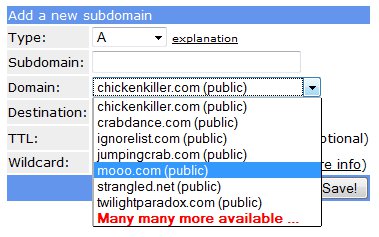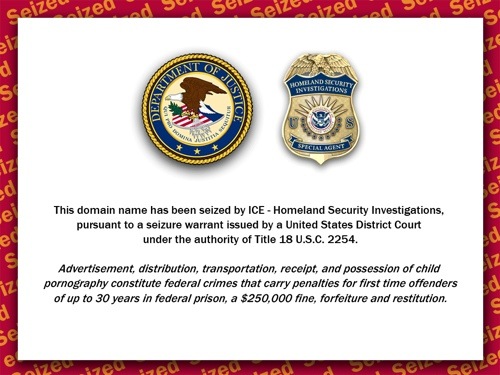DHS incorrectly associates 84,000 web sites with child pornography
On February 15th a joint project of the Department of Homeland Security Immigrations and Customs Enforcement (ICE) and the Department of Justice termed “Operation Protect Our Children” confidently announced the seizure of ten domain names involved in the advertisement and distribution of child pornography. What they failed to mention was that they also knocked out a popular shared domain by mistake, resulting in, according to TorrentFreak, some 84,000 web sites being taken down and redirected to a banner mentioning child pornography.
Free DNS is a service that provides free DNS hosting, subdomain, and domain hosting among other services. The most popular subdomain offered by the service, mooo.com, was accidentally caught up in the ICE sweep of domains taken down.
That left legitimate sites such as http://greyghost.mooo.com redirecting to an ICE web page with this banner, telling visitors “Advertisement, distribution, transportation, receipt, and possession of child pornography constitute federal crimes that carry penalties for first time offenders of up to 30 years in federal prison, a $250,000 fine, forfeiture and restitution”:
ICE is able to force this by first getting a District Court judge to sign off on a seizure warrant, and then having the domain registrars re-point the domains to their server hosting the warning banner. At 7:07 on the 12th, the following message was posted by Free DNS after realizing what happened:
Operation In Our Sites
ICE launched their initial endeavor in domain seizures last year under “Operation In Our Sites”, aimed at seizing the domain names of those who infringe on copyrights. Legitimate criticisms of these seizure tactics included targeting web sites that claimed (with paperwork) they were not actually infringing on copyrights and investigations conducted by agents without adequate training or experience. For example, ARS Technica noted one definition from an affidavit provided by an ICE agent that read as follows: “A Bit torrent (referred to in short as ‘torrent’ or ‘torrent file’) is a files distribution system used for transferring files across a network of people.” The lack of technical understanding present in an investigator who is then providing direct input into which domains will be taken down is of concern.
Finally
Site owners in this most recent case were presented with the unenviable task of explaining to visitors that they had no affiliation with child pornography. Since these are personal web sites, blogs, and small businesses, this is material to some of the site owners.
This screw up in a well intentioned, but overreaching and ham fisted, government legal action on the Internet comes at a time when legislation requesting further capabilities, such as an “Internet Kill Switch”, is being discussed. Such screw ups, and glossing over them in reporting on the project, do not serve to strengthen ICE’s ability to be successful in future enforcement actions on what is the very serious problem of dissemination of child pornographic material on the Internet.


